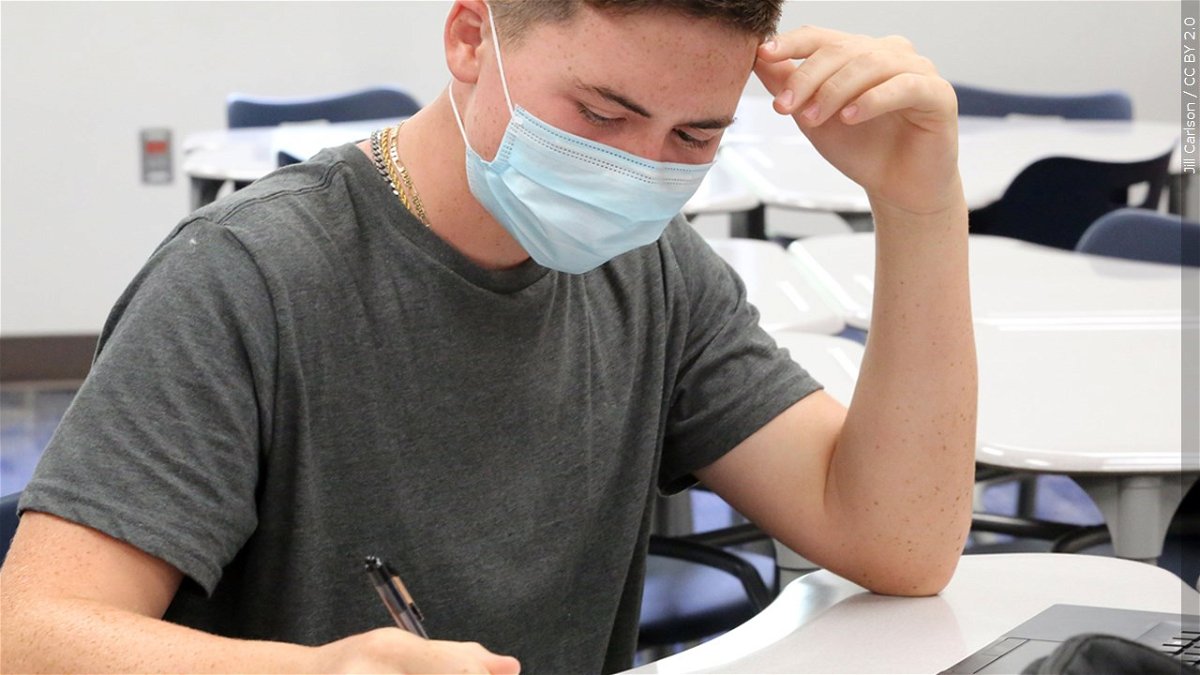California changes course on schools enforcing mask mandate

Story by ADAM BEAM of the Associated Press
SACRAMENTO, Calif. (AP) — After initially telling schools they must send students home if they refuse to wear masks indoors, California public health officials abruptly changed course and said districts will be able to decide how to enforce the mask mandate.
While California says fully vaccinated people don’t have to wear masks in most public places, the state has different rules for schools. Last week, officials said students and staff at schools must continue to wear masks indoors at all times, even if they are fully vaccinated.
California officials released details of those new rules Monday afternoon, including a requirement that schools “must exclude students from campus if they are not exempt from wearing a face covering under (the rules) and refuse to wear one provided by the school.”
The mask requirement and its enforcement reignited criticism of Democratic Gov. Gavin Newsom, who is facing a recall election in September. But a few hours after releasing the rules, the state changed them. Masks are still required indoors at schools at all times, but now local districts can decide how to enforce that rule — something they have been doing throughout the pandemic.
The California Department of Public Health “put out updated guidance to ensure schools can continue enforcing the mask requirement as they have been doing for the past year,” Newsom spokesman Alex Stack said.
Troy Flint, spokesman for the California School Boards Association, said the updated rule “is a huge difference in terms of how districts would operate and how the public is going to receive this guidance.”
The rules could also force districts into some tough decisions. All California schools are required to resume in-person instruction when the school year starts. But a new law Newsom signed last week requires districts to let students complete their work at home if their parents or guardians say coming to school puts their health at risk.
The new rules requiring masks in public schools also says districts must let students complete their work at home if officials decide to bar them from school for refusing to wear masks.
“If you have a district that chooses to take a harder line on masking and a subset of parents that doesn’t want to comply, the school is obligated to provide independent study in a really robust way that asks more of the district than has been done in the past,” Flint said.
The Centers for Disease Control and Prevention last week said teachers and students who are fully vaccinated don’t have to wear masks indoors but recommended that students and staff stay at least 3 feet (1 meter) apart to reduce the spread of a disease that is primarily transmitted through the air.
State officials were worried that imposing social distancing would make it harder for some schools to accommodate all students. So, they made a choice: They won’t require physical distancing in exchange for everyone wearing masks. The state plans to review the rules and possibly change them by Nov. 1.
Newsom faced heavy criticism for not moving more quickly to return students to classrooms during the last school year. Many districts, including Los Angeles with more than 550,000 K-12 students, only instituted part-time, in-person instruction for the final weeks of the semester.
The mask requirement angered some parents who say children will have added stress after already having two school years upended through remote learning and missed milestones like proms, sports, concerts and graduations.
“We’re continuing to put the burden of this pandemic on our children, and it needs to stop,” said Jonathan Zachreson, a father of three and founder of the group Reopen California Schools.
Dr. Monica Gandhi, an infectious disease doctor and professor of medicine at the University of California-San Francisco, said public schools should reconsider mask requirements once hospitalization rates fall below five per 100,000 people and at least two-thirds of adults have received at least one dose of COVID-19 vaccine. While those thresholds have been met in some parts of California, Gandhi called the new rules reasonable.
She said that while eliminating the physical distancing requirement is one of the best things the state can do to get kids back in classrooms, whether to require masks is a gray area because there is so little data about children.
“We’ve just got to get the kids back and then we can sort out those kinds of details,” Gandhi said.
Dr. Jeffrey Klausner, a clinical professor of population and public health sciences at the University of Southern California, said the rules go too far and are not based on local data. He said it’s unreasonable “in a state of 40 million people, just to say everyone has to be the same.”
“I think they’d have better trust and credibility with Californians if they were a little more nuanced and smarter about it,” he said.